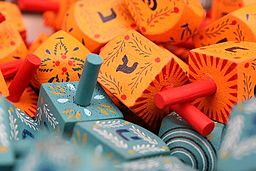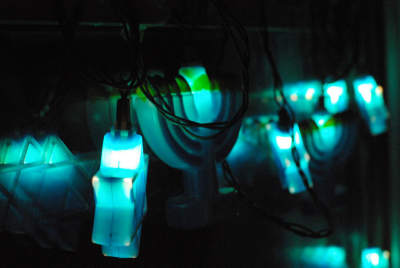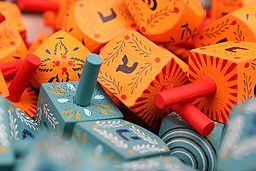When I was little, I looked forward to the day in December when my dad asked us to dig the “Chanukah box” out of the attic. Out came the electric menorah to put in our window, the glitzy blue and silver garland of dreidels and Jewish stars to hang on our bannister, several rolls of Chanukah-themed wrapping paper, and even a big plush dreidel that my sister used to play with as a baby.
My family’s Americanized, commercialized Chanukah has its fair share of critics. Around this time of year, it’s popular to rag on American Chanukah. When it comes to Jewish religious tradition, Chanukah is arguably a minor holiday that we’ve inflated given its proximity to Christmas. In a lengthy piece about Chanukah for The Atlantic last year, titled “Chanukah, Why?” or “How American Jews Ruined Chanukah,” Emma Green suggests that Chanukah’s traditions are boring and its theological basis flimsy.
“As far as holidays go, Hanukkah sucks,” she writes. Green narrates the history of Chanukah in America: how Reform rabbis created Chanukah festivals to make Judaism more fun for children and how Chanukah’s significance grew as Americans Jews became more financially successful and could afford presents. She points out the irony that Chanukah, with its public menorah lightings, has become the most prominent Jewish holiday, despite its lack of liturgical importance. “This public performance gives the holiday a distinct air of trying too hard: to compete with Christmas, to be colorful and loud, to demonstrate Jewishness, all without having to deal with Jewish theology, law, or morals,” writes Green. She continues to assert that Chanukah has little meaning or lacks substance.
I say, speak for yourself. First of all, “meaning” is subjective, and the meaning of holidays is not measured only in their liturgical content. Cultural and historical context can imbue meaning just as much as the Bible can, and meaning varies for each individual. I would argue, actually, that Hanukah actually had more meaning to me for most of my childhood than Yom Kippur, which I just thought of as “the holiday where we don’t eat” until I came to better understand it as an adult.
Therefore, I don’t think it’s such a bad thing that Chanukah has been redefined in the context of American culture or that American history has elevated it to undue stature. Sure, the story of American Chanukah is one of the all-encompassing nature of capitalism and the pressures of assimilation; yet it’s also a history of multiculturalism and the forging of successful Jewish identities in the diaspora. For families that don’t celebrate Christmas, Chanukah is a way to participate in the American holiday spirit without bowing to societal pressure to adopt majority traditions that aren’t ours. For interfaith families that celebrate Jewish and Christian holidays, Chanukah is an opportunity to celebrate multiple traditions in the same season and reinforce the values of pluralism and coexistence.
Chanukah has also been a useful entry point, an opportunity to share my tradition with others. It is the flag I wave during Christmas season to say, “Here I am, a Jew, in your midst.” As a child, my mom used to come into my elementary school class and do a little presentation on Judaism and Chanukah. I’d go over to my friend’s house and learn how to decorate a Christmas tree. Celebrating an Americanized Hanukah was an opportunity to assert my identity as an American Jew.
Ultimately, the idea that this way of celebrating is somehow “wrong” or “incorrect” suggests that there is such a thing as a pure or correct Jewish tradition, which ignores the fact that all Jewish ritual has been shaped and changed by cultural and historical context. The critique of commercial Chanukah speaks to a larger issue. With the rise of an Israel-focused Jewish identity in the late twentieth century, there has been a devaluation of Jewish identity in the diaspora, an idea that those of us who are living in the diaspora are somehow less real, less pure in our Judaism. Yet for many of us, diaspora is an integral part of our Judaism, rather than an impediment to our practice.
The daily minutes of my life in America were the scaffolding upon which my Jewish identity was built. My Hebrew school classes were followed by soccer practice with classmates of all different faiths and backgrounds. I channel my Jewish social justice ideals into activism against injustice in the United States. I raise my glass to “next year in Jerusalem” at Passover seders in relatives’ American homes, focusing on metaphorical dreams for next year instead of Jerusalem as a physical place. As much as I rail against many of the driving forces in American history – white supremacy, capitalism, nativism, patriarchy – this is the only home I know. My Jewishness is rooted here.
Everyone’s Jewish identity is different. I don’t want to minimize the struggles of holding a minority identity or romanticize the costs of Americanization, assimilation, and life under Christian hegemony. No one should ever be required to adopt majority (and capitalist) traditions in order to be treated and respected as full citizens. But the gleeful mocking of the American Chanukah I grew up with feels like just another round in the game of policing diverse expressions of Jewishness.
While home on break this year, I gathered with family in my grandpa’s house, eating Trader Joe’s latkes and bagels and lox. We listened to his old Chanukah records—peppy children’s versions of songs like “Chanukah O Chanukah”–and exchanged gifts. It felt like home. Gatherings like this aren’t a silly diversion from my Judaism. They are the essence of it. I wouldn’t have it any other way.
Mari Cohen is a journalist, poet, and fourth-year history major at the University of Chicago.



